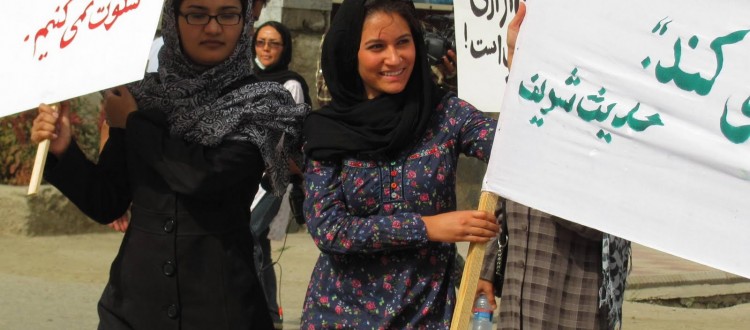Advocating for gender equality in Afghanistan
Not all Afghan men are violent and disrespect women’s right but there are many who defends and advocate for women’s right. Mujib Wais Ezat’s message is strong enough to be used as a tool to advocate for gender equality and the rights of women, and encourage others to raise their voice and the opportunities they have in order to end violence against women.
| Suggested Reading | Conflict Background | GCCT |
By Maryam Safi
We often see or hear in the media about violence and injustice against women by men in Afghanistan. Many people generalize what is happening and think Afghan men don’t believe in gender equality and are always violent towards women. This is not true. Not all Afghan men are violent against women, and nor do all of them disrespect women. There are many Afghan men that advocate for gender equality and promote women’s rights.
To better reflect on this issue I have copied Mujib Wais Ezat – an Afghan living in Sweden since 2006. He received a Master’s degree in national economy and political science from Stockholm University and has written three books in Dari/Persian, based on true stories. He doesn’t only believe in gender equality but also advocates for women’s right. On International Women’s Day (8th March), a statement was posted on his personal Facebook page on but the message worth to be spread.
“8th of March!
I do not want to have just flowers to celebrate the “women’s day”, for me every day on the calendar is the eighth of March.
Eight March, is celebrated as a specific day to perceive the dignity and honour of the place and role of women in society indeed. However, it is the best opportunity to talk about their role and situation in the society, we need to gather in the whole world and support women in order to bring a significant change in their lives and status of women, a greater establishment is needed to fight for more equality and women rights.
There are millions of women living under the roof of harassment, intimidation, defamation and violence. In the most countries the status of women in government institutions, political and social organizations are just symbolic and superficial. It is not enough to have women in politics and as leaders, we need an equal mentality to grasp and perceive the role of a woman as a human, equal to a man and not a person who needs to be supported by a man in order to live a secure life.
For me empowering women with equal opportunities is to give them the opportunity of training, education, employment and active participation in all sectors of life, this is the short-term goals to be achieved worldwide. We need to work on mentality of the human being, both men and women to respect each other as human being, not according to their gender.
For me, every day on the calendar is the eighth of March, and fighting for women’s rights will always be my priority!”
Ezat’s message is strong enough to be used as a tool to advocate for gender equality and the rights of women, and encourage others to raise their voice and the opportunities they have in order to end violence against women. This will also help to build positive thinking toward women and will also build the understanding that not all Afghan men are violent, but there are many that respect and protect women’s right.
Ezat has written that “fighting for women’s right will always be a priority for”, which shows that he has already started his battle in this field by sharing his positive thinking toward women through his message. And this is one of the best ways to fight with violence, inequality and injustice in relation to women and promote their rights.
Maryam Safi, from Afghanistan, worked for Sanayee Development Organization (SDO), a member of theGlobal Coalition for Conflict Transformation, as Program Manager for Peacebuilding and Conflict Resolution.
The views expressed in this article do not necessarily reflect those of TransConflict.




















RT @gcct_tc: Advocating for gender equality in #Afghanistan: Not all Afghan men are violent and disrespect women… https://t.co/640Gxvuj8X
Advocating for gender equality in Afghanistan https://t.co/K9iOGhIVxl via @TransConflict
RT @ena_ssudan: Advocating for gender equality in Afghanistan https://t.co/K9iOGhIVxl via @TransConflict
Advocating for gender equality in Afghanistan – TransConflict – https://t.co/iVckMqrQxn
Pingback : The sixteenth GCCT newsletter - TransConflict